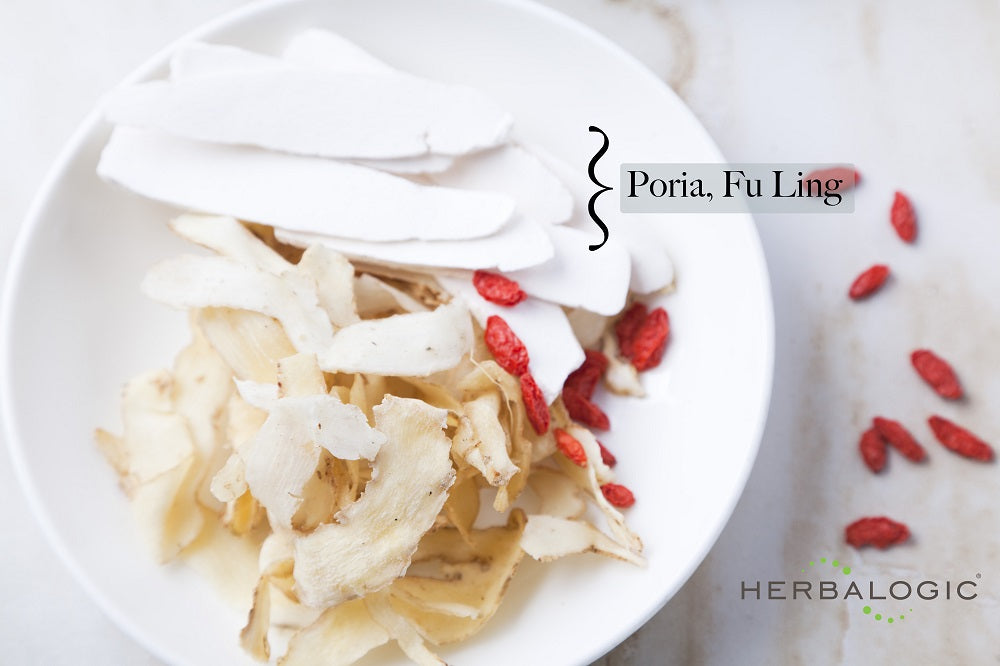I live in a townhouse with shared walls. This fact became acutely obvious a few years ago when my neighbor had the line connecting the water valve to the washing machine break, and he was not at home. I figured out that water was pouring into the building unobstructed when it had seeped through the common wall and puddled in my living room. Next day, at the behest of my insurance company, the water mitigation team arrived. I hadn’t really thought their services were going to be necessary, until the guy with the crowbar started ripping out the laminate flooring and disgusting, musty, dampness filled the air. They proceeded to tear the living flooring and baseboards out, drill holes in the common wall, and set up huge drying fans in an effort to save the wall from rot. It worked; no mold.
In the world of traditional Chinese herbs, poria is those big drying fans.
Poria Essentials
-
Scientific Name
Poria cocos
Common Name (Western)
Poria
Chinese Name (Pin Yin)
Fu Ling
Origin
Poria grows in the humid, subtropical regions of China⸬ ⸬ ⸬
-
Poria is a wood-decay fungus that grows around the roots of some types of pine trees. Basically, it’s a big, underground mushroom that resembles a small coconut. In its medicinal herbal form, it is thinly sliced either into discs that resemble white, irregular Necco wafers if the whole form was on the small side, or curled pieces that looked like bleached cinnamon sticks. From particularly large mushrooms, poria is cut into cubes similar in size to sugar cubes. If the poria is cut from the center of mushroom, there may be part of the tree root in the center of the slice. In Chinese, the different cuts of the poria are given different names to designate which part of the mushroom it came from.
⸬ ⸬ ⸬
-
The primary use of poria is to promote urination to leach out dampness, ironic considering it’s a fungus that grows underground in damp, dark conditions. In traditional Chinese medicine, the term dampness has several meanings. Dampness can refer to the physical accumulation of fluids in the body, such as edema and phlegm. But it can also refer to the abstract concept of dampness obstructing the spirit, which is more like mental health symptoms such as forgetfulness, or metaphorically cloudy thinking. Poria is useful in both cases. Traditional Chinese medicine understanding of dampness is that it arises from poor digestion, often due to the over-consumption of rich foods. Just think of how you feel in that afternoon meeting after eating a third slice of meat pizza, extra cheese, for lunch. Poria is also used to strengthen the digestive system, thus preventing the rise of dampness.
As with most Chinese herbs, using poria alone will not produce much effect. If dampness is being caused by poor digestion, poria is combined with other herds that more directly effect the digestive system. If dampness is caused by pathogenic factors, such as in cases of phlegm accumulation in the lungs, poria is combined with herbs with antimicrobial properties.
⸬ ⸬ ⸬
-
For people already experiencing frequent, copious urination without signs of infection, but rather from overall deficiency should be cautious using poria. Large doses of poria should only be used with the supervision of a trained herbalist. Small doses of poria combined with herbs that support the digestive system are safe for daily use.
⸬ ⸬ ⸬
Uses in Herbalogic Peakpower, Decompress, Peacekeeper, Flashback, Quiet Mind, Solid Eight and Stand Down
Poria ties with Atractylodes root for most commonly used herb in Herbalogic formulas, appearing in seven formulas, which is really 14 if you count liquid and capsule forms as separate, and 15 when you get into Fixed Focus HD which includes Quiet Mind; whew, that is a work-horse of an herb. It’s use in Peak Power is to promote good digestion. For Decompress, Peacekeeper, Flashback, and Quiet Mind, poria helps with quieting the spirit. And in an extra special aspect of calming the spirit, poria appears in Solid Eight and Stand Down to alleviate sleep problems rooted in an disquieted spirit.



